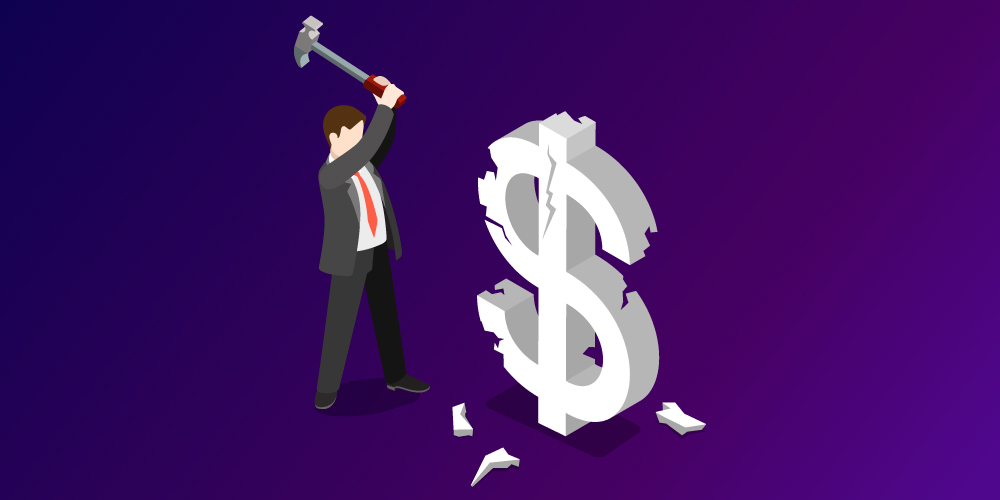Once the US dollar collapses, the majority will support the new elite currency, not the cryptocurrency. But since governments have failed to stop the cryptocurrency movement, this may happen in the future.
From Financial freedom to digital slavery
In the 80s, John Barlow believed that he was going to change the world for the better. He created Cyberspace, an online digital utopia that aims to free the world’s citizens from the power and control of the elite. Outlawing any real power in his manifesto “Declaration of the Independence of Cyberspace”, he declared the Internet a zone free of elites:
“Governments of the industrial world! Cyberspace is not within your borders. We are creating a world where everyone, anywhere, can express their beliefs without being forced into silence and submission. I declare it a social space, independent of the tyranny you impose on us.”
However, at the same time, two hackers named Phyber Optic and Acid Phreak knew that what Barlow was saying was not true. As the cyberspace movement continued to grow, governments, megabanks, and other institutions simultaneously collected vast amounts of data on citizens without their prior notice or consent.
To prove this, the duo hacked into major financial networks, stole Barlow’s credit information, and posted it online to view the rest of the cyberspace movement. This alone showed that the elites had destroyed Barlow’s vision of an Internet utopia, an isolated digital world free of autocracy.
Right now, in the 21st century, we are about to witness history repeat itself, only in a new light. Instead of cyberspace, decentralization has become the latest weapon in the fight against crony capitalism, corporatism, and elitism in modern society. Decentralized finance (DeFi), has grown by 3,400% over the past year, and its total market capitalization is now estimated at almost $ 53 billion, and will reach $ 1trillion by 2022.
Uniswap, a decentralized cryptocurrency exchange, recently surpassed $100 billion in total trading volume. With this level of interest, decentralization will eventually challenge the legacy monetary system for dominance in the near future.
But, as with cyberspace, the DeFi movement underestimated the ability of elites to maintain monetary power and control. They prepare against a decentralized threat by using their own systems against them.
Since the world’s central bank, the IMF, declared war on non-state digital currencies in 2018 in its “Monetary Policy in the Digital Age” report, most of the world’s superpowers have begun developing, piloting, and even launching CBDCs, digital currencies of central banks, using blockchain technologies.
Make no mistake: this marked the beginning of the greatest battle for monetary supremacy since the British pound, against the US dollar more than a century ago.
The Great War of Finance

Government-backed digital money systems will be very different from DeFi-based systems. They are centralized, and their task is to improve the existing system by adding new functionality in the Orwellian style. In real time, government systems will eventually track everything: our transactions, taxes, behavior, and more. Our discrepancy will be verifiable and traceable. If you think we don’t have privacy today, the next few decades will pale in comparison to when states deploy these systems.
We will have to make a choice: remain a centralist and support the new state system, or join the “decentralized” uprising. While the latter has greater economic freedom and offers an escape from financial repression, it is not as simple as giving up everyone’s legacy system.
However, this is the consensus that cryptocurrency proponents have been stating for years. They assume that the centralists will abandon the inherited system, and its owners will simply lay down their arms in defeat without a fight. They think that the masses know about alternative finance, decentralization, blockchain, and that they will sacrifice all the benefits of the legacy system in the blink of an eye to join the cryptocurrency revolt. This is, of course, one of the biggest misconceptions.
The media and social networks have turned into a ring where crypto evangelists, gold bugs and economists argue among themselves about what is the highest form of money. Over time, this created the illusion that the average person cares about the economy, finance, and cryptocurrencies, and deals with them. Ordinary people who advocate cryptocurrency simply do not know and do not care about monetary issues, such as: why interest rates are at the bottom, where the money actually comes from, and where it ends up. They find the economy decidedly boring, ugly, and clumsy, but that’s the point. He is at the bottom of a huge amount of discarded facts that they will never return to. This is a big taboo for long-term cryptocurrency bulls. Even if they “understand”, they still have enough.
Rare events do leak into the mainstream through the media. The biggest stock market drop in history. The fake Gamestop revolution and subsequent drama. But that’s all. When Bitcoin hits the headlines, for a centralist, it’s the same as local news reporting something inconsequential: a resident of Chelyabinsk went on foot to Moscow.
But for the decentralist, the massive coverage of Bitcoin will highlight their confirmation bias that the cryptocurrency is about to go mainstream. It is no coincidence that the popularity of Bitcoin increases only when the price rises, as confirmed by Google Trends. This shows that the BTC receives public support only when it can make people rich, and not because the majority wants to abandon the outdated system and join the decentralized movement.
The truth is that society as a whole hates to worry about the health of money. After all, it is easier for us to take financial incentives from the state than to believe the experts that this is very bad for the economy. We don’t want to study a 400-page book called Fundamentals of Economics. Instead, we want to eat McDonald’s burgers and drink Starbucks coffee, rather than learn about supply and demand curves and budget deficits.
Over the last cycle, we have become more like a meritocracy (the power of the worthy), so by default, we have handed over our economic and financial education to “experts”. We have waived our financial responsibility. We have become less informed and more obedient to the authorities, who may have a huge conflict of interest with our long-term goals. We do not challenge them, others, or ourselves. Personal finance is now a matter for pension funds and the government. We have adopted M. M. T. (modern monetary theory), a new school of thought with an ideology directly opposed to cryptocurrency.
Guide dogs leading into the abyss
Now, to say that the average person has abandoned reliable finance and the economy is a bit unfair, not because it is both somewhat crude and inaccurate, but because the people responsible for managing the economy themselves also do not understand what is happening. The financial media portrays the heads of central banks and the treasury as money gods, but in reality they have become just as clueless. They have lost touch with what is happening in the deep international financial waters, in the shadow banking layer run by global banking cartels.
We know this because, despite the obvious signs of stress, both in the real economy and in the monetary system, financial planners do not see serious crises approaching. “At this stage, the impact of the subprime mortgage market problems on the economy and financial markets in general is likely to be limited,” former Fed Chairman Ben Bernanke said before the 2008 crash. “I don’t see a financial crisis in our lives”, Janet Yellen said in 2017. And in September 2019, Federal Reserve officials knew that the market was about to be stressed, but Fed Chairman Jay Powell still allowed the system to collapse, with repo market rates rising more than 10%.
Since central banks can no longer define money, they now have one task: to convince you that they still know what they are doing, so that you don’t panic, and so that the financial aristocracy holds on to the inherited system that sustains their eternal life, growing wealth, and assets. Their remaining weapons are a combination of insincere optimism and linguistic alchemy. As Ryan Gosling’s character says in Big Short:
“Wall Street likes to use confusing terms to make you think that only they can do what they do. Or even better, just leave them alone”.
This largely applies to central banks as well. This masks their many failures and shows that they achieve stability at the expense of complexity. Those who tried to expose this fiction to the masses had to endure a life of solitude, and the persecution of the media.
Take, for example, Jeff Snyder, an expert in the deep dark areas of finance. It tells us very simply that most of what central bankers say is not true. However, the mainstream press is not interested in publishing any of his works.
The longer they continue this deception, the more people will know about it, which will increase the likelihood of a coordinated uprising. The problem is that this has never happened before, and probably never will. Back in 1860, the pioneer of the American automobile industry, Henry Ford, said: “It’s just good that people in the country don’t understand our banking and monetary system, because if they did, I think there would be a revolution before tomorrow morning”. Although this is repeated over and over again, history shows that the financial revolution remains a pipe dream.
Crypto Revolt: A big pipe dream?

In order for society to get even a step closer to initiating a “cryptocurrency uprising”, a crisis of significant proportions must occur, and the most anticipated monetary catastrophe is the collapse of the US dollar. When the “day of reckoning” comes for the dollar, will most people be saved by cryptocurrency or trust the legacy system that has caused so much pain to our finances for decades, which has enriched the lives of only a select few, and left the rest to suffer?
Based on history, we are likely to see the majority side with the outdated system. Because the elites have power over public perception, they will call decentralization a threat to national security, a crisis that will allow them to pass laws that protect the authenticity of the system. Decentralization threatens to strip politics of power by promoting de facto equality, which is incredibly dangerous for power-hungry gaslighters.
When introducing new Orwellian features to the legacy system, they will try to prevent all cryptocurrencies and blockchains from integrating with it. They will force major technology companies to ban access to certain DeFi systems. They will create functionality that hides the crime of rampant inflation. They don’t care that the maximum supply of Bitcoin is 21 million. Their new digital currency (CBDC, Sbercoin, or whatever), will have an unlimited face value, which will allow them to expand and increase the supply through credit and debt issuance, while killing the reliable characteristics of money.
But when it comes to stopping the DeFi movement, states fail. John Barlow’s dream of cyberspace in the 1980s has been dashed, but modern decentralized systems are now truly unstoppable. Ultimately, this will lead to the fragmentation of society, not through civil war, but through gradual civil division.
We will be divided by our loyalty to the legacy system, creating a new type of identity policy. We already have rich versus poor, Republicans versus Democrats, and left versus right. Next, we will have a narrative of centralists and decentralists. Centrists will maintain an outdated order – central banks, MMTS, free handouts, and unlimited money printing – while decentralists will retreat to “decentralized” areas.
When DeFi reaches the peak of interest, the world will experience the next economic crisis. But desperate times will require desperate measures. When the majority has to choose who is on whose side. Although the decentralized movement will offer people a way out of the legacy of a repressive financial system, most of them will trade their financial freedom and freedom for temporary financial security by choosing a centralized clone of the decentralized system.
The elites will convince the masses to turn a blind eye to financial tyranny and accept financial slavery, while the decentralists will retreat from the system, waiting for another round of economic madness, another economic boom and bust, to see if the centralists will survive, and whether they will want to continue living in the inherited system based on Orwell’s new monetary order.

